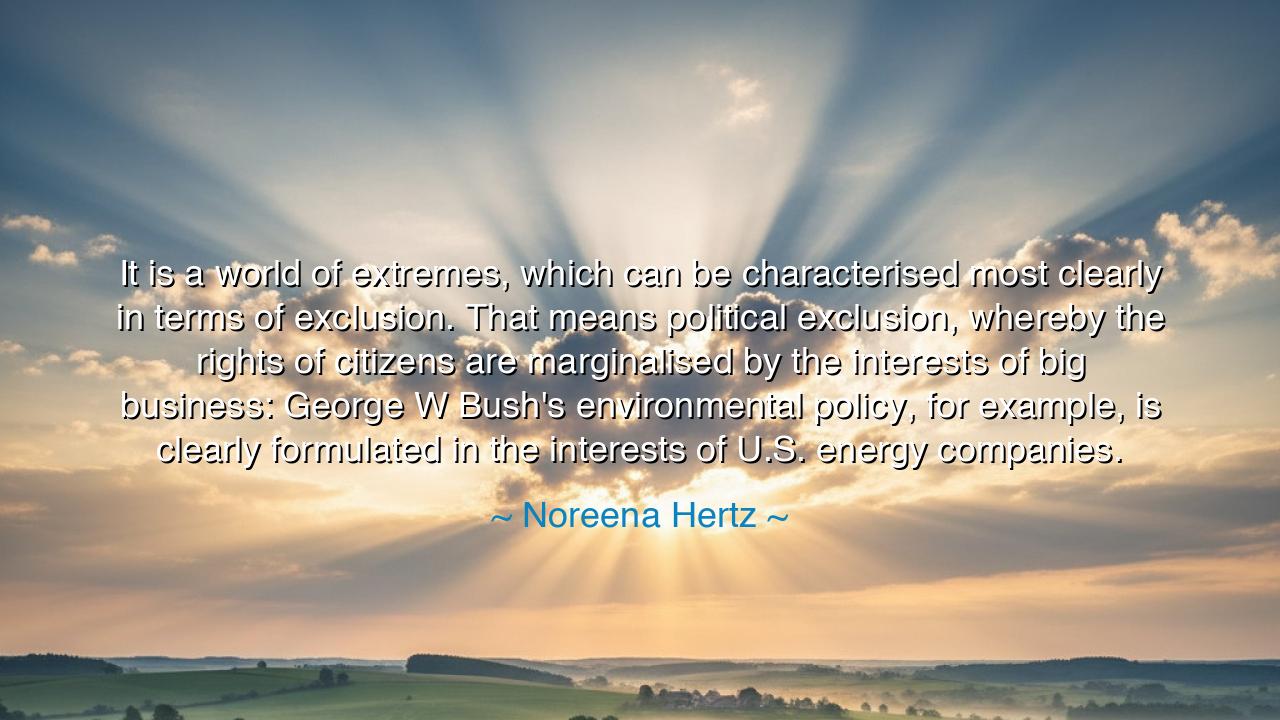
It is a world of extremes, which can be characterised most
It is a world of extremes, which can be characterised most clearly in terms of exclusion. That means political exclusion, whereby the rights of citizens are marginalised by the interests of big business: George W Bush's environmental policy, for example, is clearly formulated in the interests of U.S. energy companies.






Hear now the voice of Noreena Hertz, who gazed upon the world with unflinching clarity and declared: “It is a world of extremes, which can be characterised most clearly in terms of exclusion. That means political exclusion, whereby the rights of citizens are marginalised by the interests of big business: George W Bush's environmental policy, for example, is clearly formulated in the interests of U.S. energy companies.” This is no casual remark, but a lamentation and a warning. For in these words, we see the chasm of our age—the gulf between the few who wield power and the many whose voices are stilled.
The meaning of this teaching is fierce and undeniable. A world of extremes is one where wealth and poverty, privilege and neglect, power and silence grow ever further apart. The rich clasp their treasures while the poor are left without bread; corporations shape laws while citizens struggle to be heard. The exclusion Hertz describes is not only social, but political. It is the act of pushing aside the rights of the many so that the desires of the few may be fulfilled. When big business bends the ear of rulers, the cries of the people fade into whispers.
Consider, O listener, the example she names: the environmental policy of George W. Bush. In the early years of the twenty-first century, as the world grew increasingly alarmed by the dangers of climate change, the United States chose another path. Policies were shaped not to guard the earth, but to favor energy companies, whose profits lay in the burning of coal, oil, and gas. The needs of citizens—for clean air, for pure water, for a habitable planet—were set aside, sacrificed upon the altar of corporate gain. This is the very essence of exclusion: when the rights of the many are silenced so that the wealth of the few may grow.
But history is rich with other warnings. Recall the Gilded Age of America, when railroads and oil barons held sway over politics. The people, crushed by monopolies, saw their wages shrink while the titans of industry dictated laws. Workers struck in desperation; farmers cried out against injustice. It was only through relentless struggle—through unions, reformers, and courageous voices—that the balance shifted, that citizens reclaimed some measure of power. Thus we see that political exclusion is no new plague, but a recurring wound, one that festers whenever the guardians of justice fall asleep.
Mark well, O seeker, the peril of such exclusion. For a society that silences its citizens while bowing to wealth will find itself hollowed from within. Trust will erode, anger will rise, and the bonds of community will fray. The prosperity of the few cannot endure upon the suffering of the many. It is like building a palace on sand: the higher it rises, the swifter it falls when the storm comes. True policy must serve the people; if it serves only business, it is no policy at all, but a mask for exploitation.
Let this be the lesson: guard against exclusion, whether in the marketplace, the halls of power, or the councils of nations. Demand transparency, demand accountability, demand that leaders serve not the purse but the people. Support those who defend the earth, who raise the voices of the silenced, who resist the dominance of unchecked wealth. For if the many do not stand, the few will consume all.
Therefore, O child of tomorrow, do not remain silent in the face of exclusion. Lift your voice when laws are written for profit and not for justice. Stand beside those who are cast aside. Choose leaders who see the citizen, not merely the corporation. For democracy without vigilance is but an empty shell, and justice without action is but a dream.
Thus, heed the wisdom of Noreena Hertz: the world of extremes can be healed only when the excluded are brought back into the circle of power, when the rights of the citizen stand above the greed of business, and when the voice of the people rises louder than the clink of coin.






AAdministratorAdministrator
Welcome, honored guests. Please leave a comment, we will respond soon